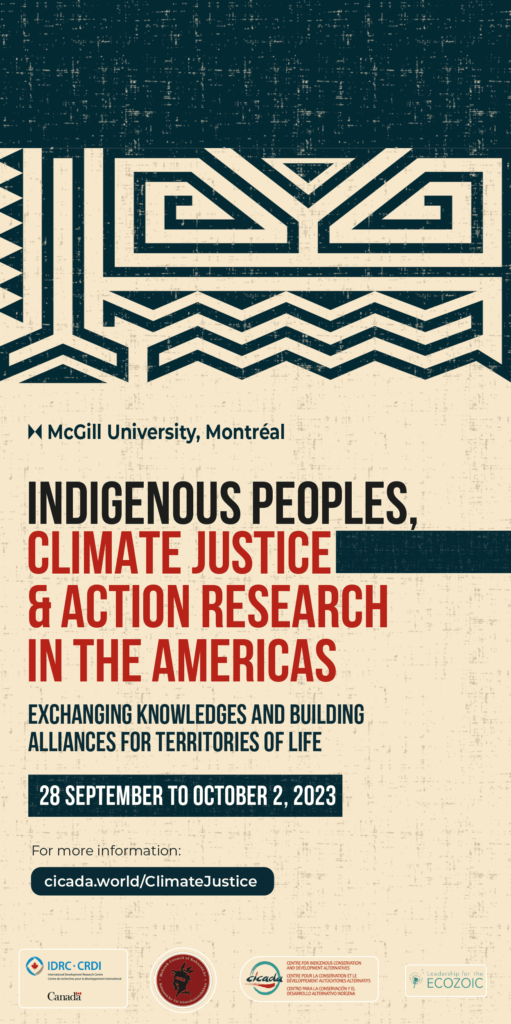Background
In the face of climate catastrophe, concepts such as climate justice, territories of life and ethical action research have emerged as potential tools to help navigate complex and uncertain times, with a view to upholding Indigenous rights and self-determined outcomes, while bringing about transformative change. But what do these concepts mean from diverse Indigenous perspectives? How are they analyzed through Indigenous gendered and intergenerational lenses? And what else needs to be considered to reign in climate catastrophe and safeguard our planet’s life systems?
These were among the critical questions examined by participants at a retreat held September 28-October 2, 2023, at McGill University that gathered some 50 Indigenous Peoples’ representatives and their academic and non-governmental allies from across Turtle Island and Abya Yala. The retreat’s objective was to exchange knowledge on political, legal, and other strategies towards climate justice grounded in Indigenous perspectives; and to identify lessons learned on ethical participatory action research approaches and methodologies, while deepening relationship- and alliance-building.
Co-hosted by the Centre for Indigenous Conservation and Development Alternatives (CICADA) and the Mohawk Council of Kahnawà:ke (MCK), the elected government of the Kahnienkehá:ka Indigenous People whose territory McGill University stands on, the series of events comprising the retreat was supported by the International Development Research Centre (IDRC) of Canada.
The following resources are now available (below):
- An executive summary and lessons learned document showcasing the key messages for policy and action arising from our discussions.
- Short videos profiling the perspectives and experiences of seven Indigenous leaders from Abya Yala and Turtle Island produced by McGill students in collaboration with McGill’s Critical Media Lab.
- A video of the roundtable discussion featuring keynote speaker Francisco Cali Tzay, UN Special Rapportuer on the Rights of Indigenous Peoples.
- The program/agenda and participants’ list.
For more information, please contact:
Viviane Weitzner, PhD
Adjunct Professor, Anthropology
viviane.weitzner@mcgill.ca
Synthesis Documents
Executive Summary
Full Report
Roundtable with Francisco Cali Tzay, UN Special Rapporteur on the Rights of Indigenous Peoples
This two-and a half-hour roundtable discussed the outcomes and key messages of our three-day retreat. It included brief opening comments by Cody Diabo, elected Chief of the Mohawk Council of Kahnawà:ke; interventions by eight Indigenous leaders (Marisol Garcia Apagueño, Pueblo Kichwa, Peru; Carlos Doviaza, Pueblo Embera, Panama; Yanet Velasco Castillo, Pueblo Asháninka, Peru; Erika Margarita Campos, Pueblo Maya, Mexico; Luis Jimenez Cáceres, Pueblo Aymara, Chile; Vairoa Ika, Pueblo Rapa Nui; Manari Ushigua, Pueblo Sápara, Ecuador; Sonia Mutumbajoy, Pueblo Inga, Colombia); a keynote presentation by Francisco Cali Tzay, Pueblo Maya Caqchiquel, Guatemala and UN Special Rapporteur on the Rights of Indigenous Peoples; and discussion.
You can find a summary of these discussions in Annex 3 of the Key Messages and Lessons Learned report (above).

